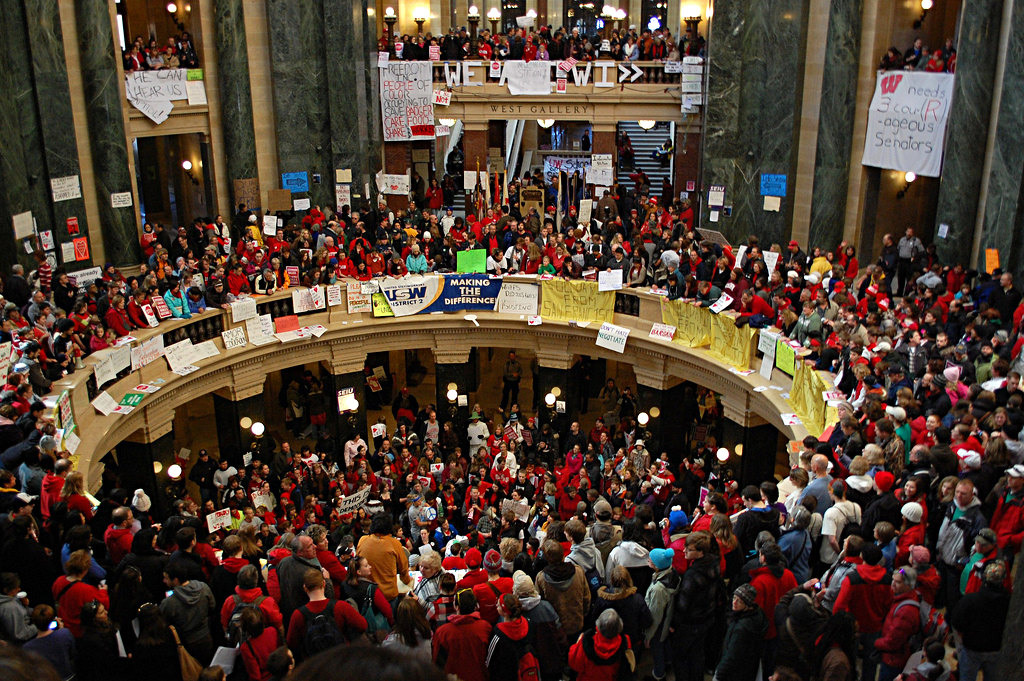Weeks after Governor Scott Walker’s union-busting bill was introduced, mass demonstrations by public and private sector workers, students, and community supporters continue, and the spirit of class struggle is spreading across the country. 100,000 demonstrated in Madison on Saturday. The only way to defeat Walker is to mobilize the full power of the labor movement, starting with an all-out one day general strike in Wisconsin and to mobilize labor for mass demonstrations and solidarity actions around the country!
Despite the huge numbers and last week’s vote by the South Central Federation of Labor (SCFL) for a general strike if the bill is passed, the Republicans are still pressing ahead. Walker is backed by powerful interests who understand that a victory or defeat here will set the pattern for these kinds of struggles nationally. There is much at stake!
The events in Wisconsin have electrified labor activists in one state after another. Hundreds and in some cases thousands have turned out in support in Nashville, San Diego, Charlottesville, Trenton, Olympia, Minneapolis, Washington D.C., Albany, New York City, and beyond. There have even been resolutions in support of the general strike from union locals in South Carolina and San Francisco.
In Indianapolis, 25,000 demonstrated on the 26th, and for the first time in the unfolding public sector battle, the mass pressure from the Labor movement forced the state legislature to drop anti-union bills that would have instituted “Right to Work” for public and private sector workers, ended collective bargaining for public sector workers, and eliminated Project Labor Agreements, laws that ensure that public building projects are given only to unionized construction companies.
Union members and supporters, taking the example of Wisconsin workers, kept vigil on the Indiana Statehouse 24/7. Percy White, a member of private-sector union Laborers (LIUNA) Local 81, quoted on the AFL-CIO’s website said: “I’m here to represent all workers, especially the ones who can’t be here themselves, and to make sure legislators know how we feel.” Like the struggle in Wisconsin, the national public sector battle is instinctively drawing support from private sector workers, who see the union-busting and anti-worker policies of the Republicans as an attack on all workers. All sectors of the working class are linking up in these mass demonstrations. Unity is strength! This is how to really pressure the bosses and their political representatives!
For decades, the unions have poured money into the Democrats (and sometimes even the Republicans) through campaign donations in the hopes of influencing the bosses’ parties to enact laws in the working class’ favor -- all to little or no avail. Obama's election was no different. The unions spent millions on his campaign, and yet we still have no Employee Free Choice Act and anti-union laws like Taft-Hartley remain on the books. But mass pressure by the working class in the streets of Indianapolis has achieved what decades and hundreds of millions of the unions’ funds could never do: force the political representatives of Big Business to back down!
“Shared Sacrifice” Means Austerity
Fox News, the Republican Party’s media mouthpiece, has gone into “overdrive,” day after day spewing the lies of Big Business, attacking public workers and praising Walker for “standing up for the tax-payers.” They are pushing the idea that public workers' pay and benefits are the cause of the public sector crisis. They paint public sector workers as “privileged” compared to workers in the private sector. However, the Center on Budget and Policy Priorities recently released a report that clearly shows that this isn’t the case:
“Public employees are paid 4 percent to 11 percent less than private-sector workers with similar education, job tenure and other characteristics. This wage disadvantage is greatest for higher-wage public workers. Public employees also earn less than their private-sector counterparts when you count both their wages and benefits such as pensions and health insurance. Benefits are more generous and secure for public employees than for most private-sector workers. But even after factoring in the value of these benefits, it does not eliminate the gap between public employees and their counterparts in the private sector.”
 Madison, February 26. Photo: Fibonacci Blue Workers are being told that the economic crisis is their fault, but as the demonstrations across the country show, millions of us don’t believe this for a second! The budget crisis is due to the economic recession, which is a product of the boom-slump cycle inherent in the capitalist system. To their credit, the union leadership has consistently argued that public sector workers are not to blame for the crisis. This is a start, but that is not the only lie in Big Business’ arsenal of disinformation that needs answering.
Madison, February 26. Photo: Fibonacci Blue Workers are being told that the economic crisis is their fault, but as the demonstrations across the country show, millions of us don’t believe this for a second! The budget crisis is due to the economic recession, which is a product of the boom-slump cycle inherent in the capitalist system. To their credit, the union leadership has consistently argued that public sector workers are not to blame for the crisis. This is a start, but that is not the only lie in Big Business’ arsenal of disinformation that needs answering.
Along with blaming the working class for the capitalist slump, the bosses also say that there must be “shared sacrifice” to make up budget shortfalls in the public sector and to keep up company profits in the private sector. This is the line of the Democratic Party, and unfortunately, this line is also followed by many union leaders. For example, over the weekend, Labor Secretary Hilda Solis, addressing the Democratic National Committee (which has been scrambling to intervene across the country to “aid” public sector unions) said the following:
"We know that many states are facing tough budget decisions. We know that there’s room for shared sacrifice. And we’ve seen our brothers and sisters in the public employees unions willing to give their share, and to negotiate in good faith to help their states get through tough times."
Ever since we launched the Campaign for a Mass Party of Labor, we have explained that although the Republicans represent the more openly vicious wing of the bosses, the fact is that the Democrats are also imposing austerity measures to prop up the big banks and the Fortune 500, at the expense of the working class. The end result is the same: lower quality of life for US workers.
Within the current US political set up, the Democratic Party acts as the “left boot” of the bosses, engaging in a form of demagogic populism while leaning on the unions for an electoral base. While the Republicans simply come straight after our wages and benefits, the Democrats’ strategy is in fact much more sinister: to push through cuts while “involving” the leaders of the working class in making the “hard choices.” The aim is to make it seem as though the workers have been “consulted” and that there is some kind of equal “partnership.” This “business unionism” approach subordinates the interests of the workers to those of the bosses. In other words, it's good for the bosses, but not for the workers. As someone once famously put it, it is like the “partnership” of the horse and rider -- just as the rider digs in his spurs!
The working class did not cause the slump, and more importantly, we should not have to pay the price for it! If the leadership of the organized working class had a class-independent policy and outlook, they would refuse to be “involved” in making those “hard choices,” and would instead demand that the rich should be made to pay for the crisis of their own making.
How to Beat Walker
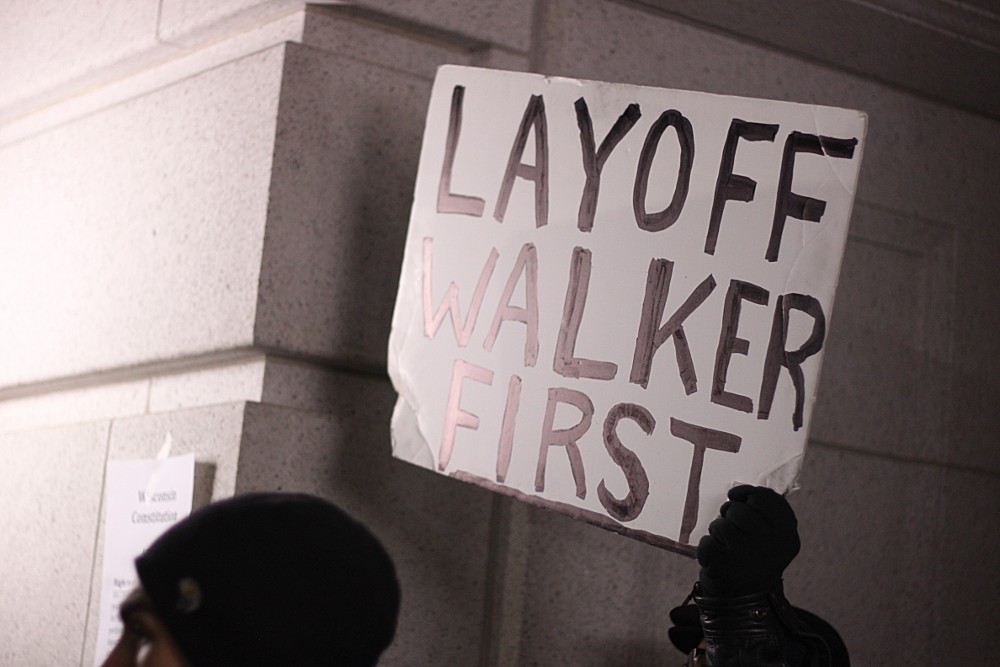 February 28, outside the Capitol building. Photo: Mark Riechers The mass demonstrations in Wisconsin continue despite the clearing of the Capitol building of demonstrators over the weekend. However, it appears that union members, students and community supporters plan re-occupy the building. The struggle has inspired thousands of workers and young people across the country, and many have spontaneously gone to Madison to participate in the demonstrations. The morale of the workers is still high and they are ready to strike, but Governor Scott Walker and the Republicans still refuse to back down. Walker spent the week appearing on television and giving interviews to the press. He has now given public sector workers a direct threat: if the 14 Democratic members of the state legislature refuse to return to Madison from Illinois and end their boycott of the vote on the bill, he will be “forced” to immediately lay off as many as 30,000 public employees.
February 28, outside the Capitol building. Photo: Mark Riechers The mass demonstrations in Wisconsin continue despite the clearing of the Capitol building of demonstrators over the weekend. However, it appears that union members, students and community supporters plan re-occupy the building. The struggle has inspired thousands of workers and young people across the country, and many have spontaneously gone to Madison to participate in the demonstrations. The morale of the workers is still high and they are ready to strike, but Governor Scott Walker and the Republicans still refuse to back down. Walker spent the week appearing on television and giving interviews to the press. He has now given public sector workers a direct threat: if the 14 Democratic members of the state legislature refuse to return to Madison from Illinois and end their boycott of the vote on the bill, he will be “forced” to immediately lay off as many as 30,000 public employees.
Walker has quickly lost most of whatever popular support he may have had before his attack. According to a New York Times/CBS poll, the public opposes weakening the bargaining rights of public employee unions by 60 percent to 33 percent. The poll also found that if Wisconsin voters could vote today, Scott Walker would lose by a 52-45 margin.
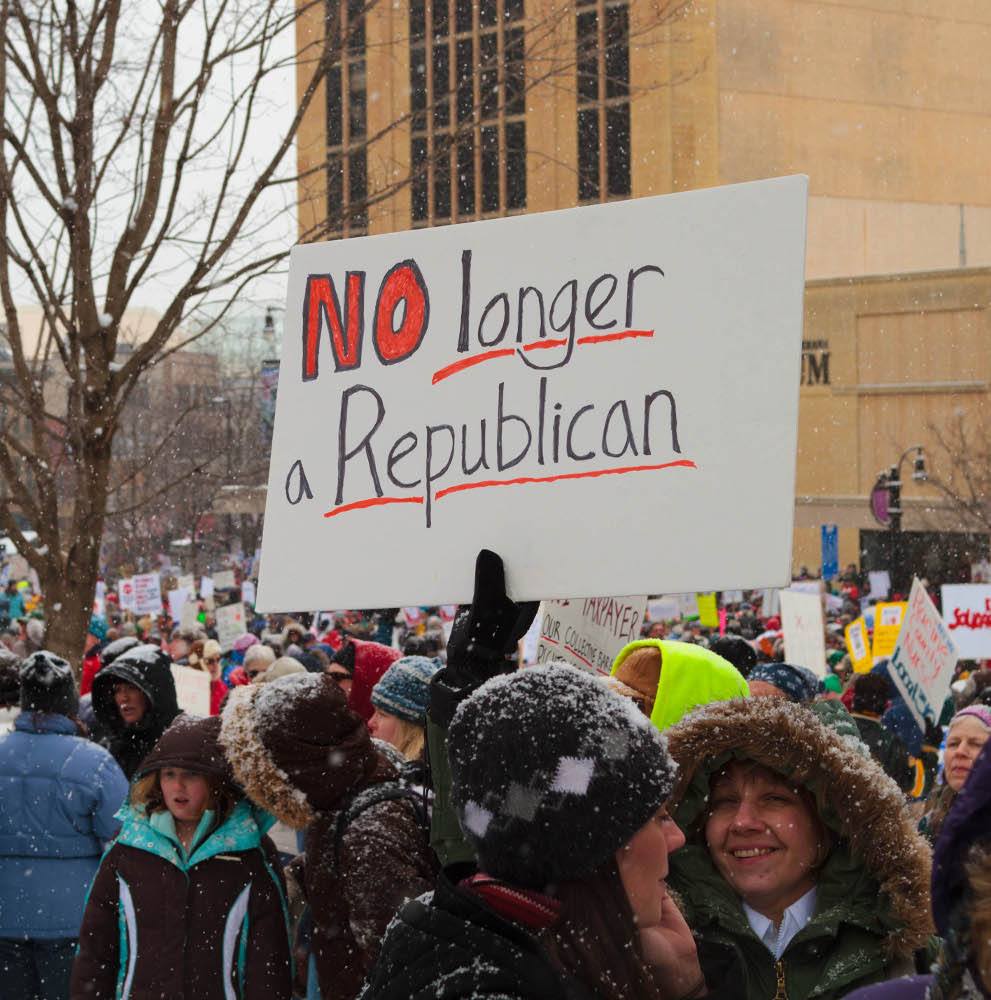 February 26, Madison. Photo: Matt Baran Walker is under pressure from all sides. The billionaire Koch brothers, bankrollers of the Tea Party, have surely made it clear to him what is at stake for the rich: more cuts are needed and organized labor's power must be curtailed. But he is also under the pressure of thousands of workers and students demonstrating around and inside the Capitol rotunda day and night. And as the solidarity demonstrations nationwide have grown larger, he is under pressure from other state governors and the Federal government to relent before the struggle intensifies further and gets “out of control.” A victory by the workers in Wisconsin would embolden workers everywhere. There are also tensions within the Wisconsin government, especially between the Governor and the police.
February 26, Madison. Photo: Matt Baran Walker is under pressure from all sides. The billionaire Koch brothers, bankrollers of the Tea Party, have surely made it clear to him what is at stake for the rich: more cuts are needed and organized labor's power must be curtailed. But he is also under the pressure of thousands of workers and students demonstrating around and inside the Capitol rotunda day and night. And as the solidarity demonstrations nationwide have grown larger, he is under pressure from other state governors and the Federal government to relent before the struggle intensifies further and gets “out of control.” A victory by the workers in Wisconsin would embolden workers everywhere. There are also tensions within the Wisconsin government, especially between the Governor and the police.
The police union has already demonstrated in support of other public sector employees, marching under “Cops for Labor” banners, and the union declared it would refuse to remove demonstrators from the Capitol building. After the interesting revelations of a “prank call” to Walker by a blogger impersonating David Koch, during which Walker admitted he had toyed with the idea of planting provocateurs among the demonstrators, his relationship with the police chiefs has been icy. Dane County Sheriff David Mahoney told a press conference Monday: “When asked to stand guard at the doors that duty was turned over to the Wisconsin State Patrol because our deputies would not stand and be palace guards. I refused to put deputy sheriffs in a position to be palace guards.”
In other words, the very institution designed to keep “order” is hostile to the Governor. If public sector and private sector workers and students join together in an all-out one day general strike, these pressures and tensions would be magnified further and Walker could be forced to give in. Walker claims that his actions will make Wisconsin “open for business” -- but a general strike and broad support among small business owners for the union protesters isn't quite the effect he intended!
Prepare the general strike!
Unfortunately, many Wisconsin union leaders have been hemming and hawing about the prospects for a genuine general strike. They cite all kinds of legalities and other reasons not to build for it properly. As if throwing out 175,000 union members' union contracts were “legal!” It is also unfortunate that the public sector union leaders have bent over backwards to accept any and all wage and benefits concessions demanded by Walker, as long as he doesn't take away their right to collective bargaining. If he were to suddenly accept these terms, tens of thousands of workers and their families would see their quality of life dramatically reduced, and would be left with a union in name only.
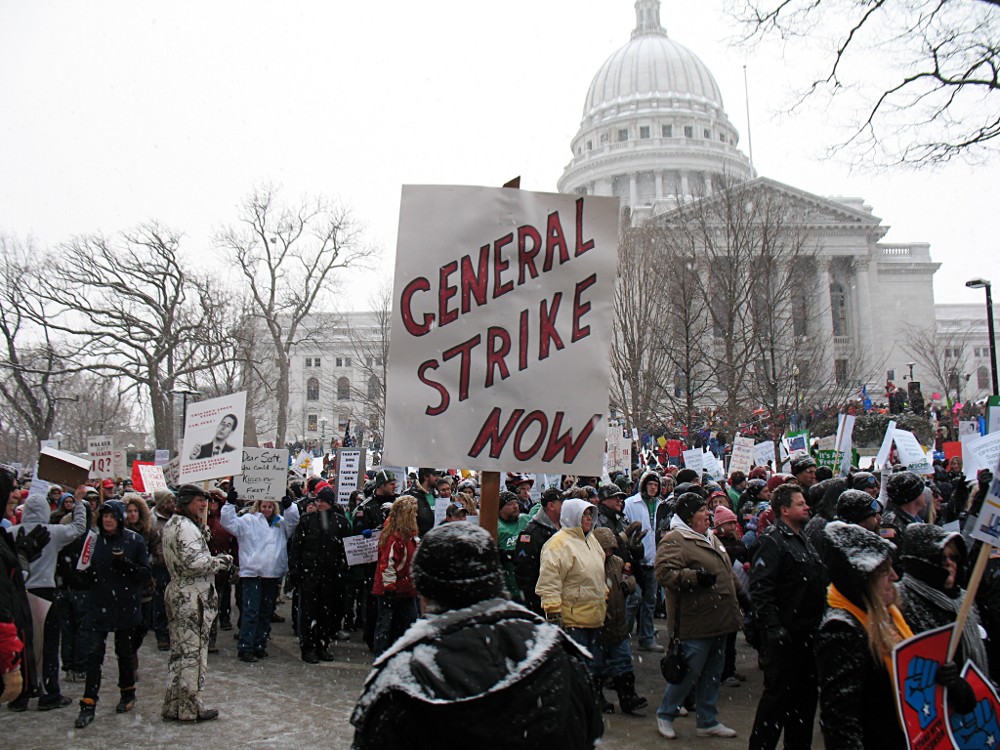 February 26, Madison. Photo: Yuri Keegstra Fortunately, the rank and file has other ideas. This is a fight we can win. Walker and the Republicans are waging an all out struggle against the public sector unions. The private sector unions will be next. What is needed is a bold fight back. The only way to defeat them is through an all-out, one day general strike in the state of Wisconsin -- to be extended longer if necessary.
February 26, Madison. Photo: Yuri Keegstra Fortunately, the rank and file has other ideas. This is a fight we can win. Walker and the Republicans are waging an all out struggle against the public sector unions. The private sector unions will be next. What is needed is a bold fight back. The only way to defeat them is through an all-out, one day general strike in the state of Wisconsin -- to be extended longer if necessary.
The time is now for the SCFL leadership to begin serious preparations, first and foremost by forming action committees in every state and local government department, in every school and university, with representatives of these committees linked together in a democratic central strike committee. SCFL should also appeal statewide to public and private sector unions to join them in solidarity actions. A mass “town hall” meeting should be held in Madison and other cities around the state, to discuss how to involve the general public. An injury against one is an injury against all!
The outcome of the struggle in Wisconsin will set the pattern for how the unfolding national public sector struggle will develop. If Walker were to refuse to back down even in the face of a general strike, this would be a blow to workers across the country, but the struggle would be far from over. Walker has already provoked the working class, which has largely had its head down under the weight of the economic crisis. The revolutionary developments in the Middle East are also acting as a powerful point of reference.
It is possible that a general strike could force Walker to reach a deal with the Democrats, giving up his demand to deny public workers collective bargaining rights but keeping pay and pension cuts. While this outcome would be seen by most workers as a victory, we believe that later on, as those thousands of workers and students look back at events and analyze them, they will realize that it was only a partial victory at best. “Shared sacrifice” is just another form of austerity despite it’s “egalitarian” name!
This is a National fight!
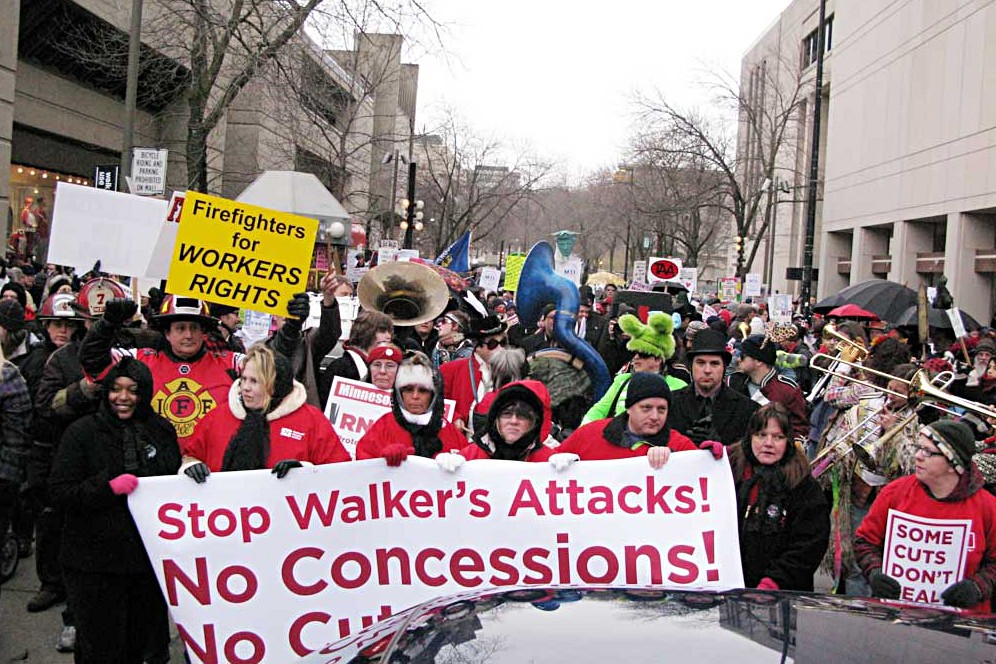 Mach 4, Madison. Photo: Robin Davies There is another course events could possibly take. The struggle could spread even further. These attacks are nationwide in scope, and require a nationwide response if we are to stop them. For this to happen, the union leaders would have to adopt different policies and break with the Democrats. Following on from the October 2nd “One Nation” demonstration, the AFL-CIO, Change to Win, and the National Education Association should mobilize their millions of members in a march on Washington to demand the immediate release of $500 billion in federal aid to states and cities and a mass program of useful public works.
Mach 4, Madison. Photo: Robin Davies There is another course events could possibly take. The struggle could spread even further. These attacks are nationwide in scope, and require a nationwide response if we are to stop them. For this to happen, the union leaders would have to adopt different policies and break with the Democrats. Following on from the October 2nd “One Nation” demonstration, the AFL-CIO, Change to Win, and the National Education Association should mobilize their millions of members in a march on Washington to demand the immediate release of $500 billion in federal aid to states and cities and a mass program of useful public works.
Such a program would create millions of union jobs and solidify support from the construction unions. This money could be used to plug the budget shortfalls and increase needed services while providing better infrastructure. For example, why can't we have high speed rail between all major US cities? Wisconsin's workers can win this struggle if it spreads, but we need a winning strategy. If instead of expanding the struggle, the Labor movement demobilizes, this fight will be defeated.
There has been no national, mass movement of the US working class in most people’s living memory. The traditions and lessons of the mass struggles of the past have yet to be re-discovered by the vast majority of the working class. They say that experience is the best teacher. Now, hundreds of thousands of workers are being directly introduced to the class struggle for the first time.
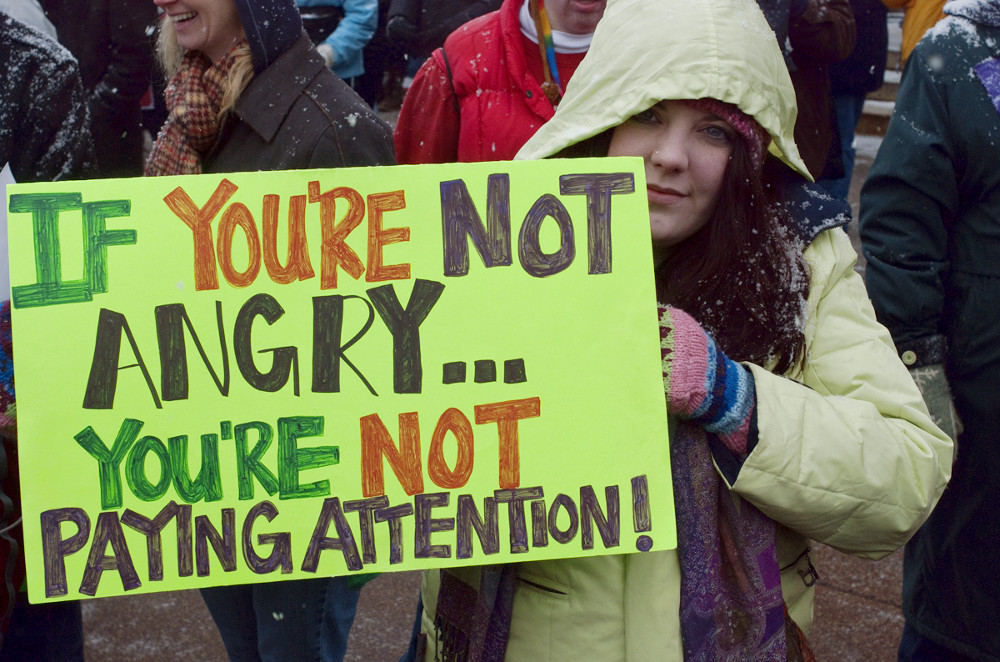 February 26, Madison. Photo: d76 No matter what happens, the dramatic transformation in workers' consciousness as a result of this experience cannot be quantified, and has big implications for the future. For perhaps the first time in state history, the strains of “Solidarity Forever” have resonated in the halls of the Wisconsin state capitol. But people are still mostly acting instinctively, caught up in the excitement of the moment. The process of analyzing events and absorbing the lessons will come after these first battles end. Win or lose, the CMPL wants to help start this discussion, both inside and outside the labor movement.
February 26, Madison. Photo: d76 No matter what happens, the dramatic transformation in workers' consciousness as a result of this experience cannot be quantified, and has big implications for the future. For perhaps the first time in state history, the strains of “Solidarity Forever” have resonated in the halls of the Wisconsin state capitol. But people are still mostly acting instinctively, caught up in the excitement of the moment. The process of analyzing events and absorbing the lessons will come after these first battles end. Win or lose, the CMPL wants to help start this discussion, both inside and outside the labor movement.
- Solidarity with Wisconsin's Public Workers - an injury to one is an injury to all!
- No to concessions - build for a one day state-wide general strike!
- Mobilize Labor nationally to fight the cuts - for a mass program of useful public works!
Source: Campaign for a Mass Party of Labor (USA)
Videos from the struggle

